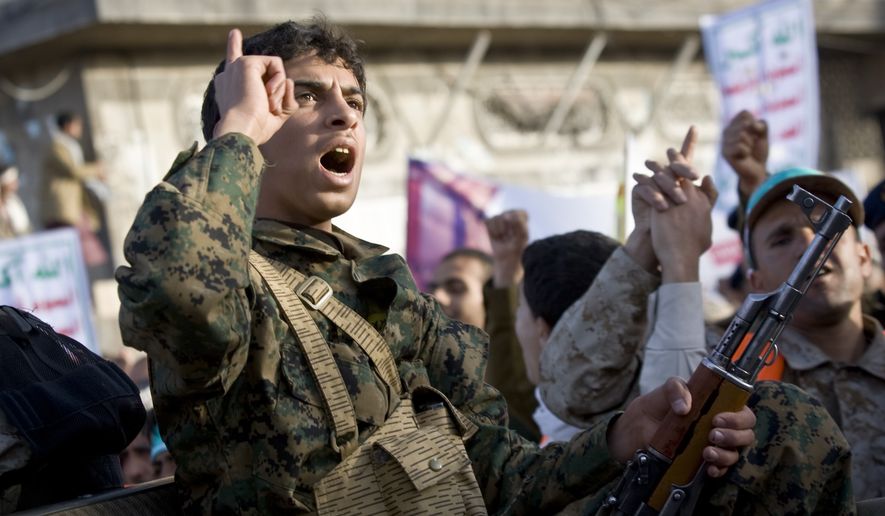The surge in Yemen this week by Shiite Muslim militants represents what some national security insiders are calling a “huge victory” for Iran, just as the Obama administration faces criticism for being too lenient in nuclear talks with the Islamic republic and appears — at least tacitly — to be coordinating with Tehran against Sunni terrorists in Iraq.
The status of Yemen’s government remained unclear Friday after coming under siege for days by Shiite militants known as the Houthis, a group that has long battled for influence among a host of armed and extremist factions in Yemen including the Sunni Muslim group al Qaeda in the Arabian Peninsulay (AQAP).
Congressional sources say the Iranian Revolutionary Guard Corps’ elite Quds Force has been suspected of smuggling AK-47s, rocket-propelled grenades and other weaponry to the Shiite Houthi rebels since at least 2012. And some analysts now assert that Tehran’s goal has been to shape the Houthis into an Iranian proxy, much the way Hezbollah is in Lebanon.
“Initially, the Houthis had very real and local grievances in Yemen, but over the last few years the Iranians have reached out and co-opted them,” says Michael Rubin, a scholar focused on the region at the conservative American Enterprise Institute in Washington.
Other analysts warned of the Iran connection when the Houthi militants first began threatening a takeover of Yemen’s capital months ago, noting that Tehran’s deeper vision may be to seize control over a key waterway in the Persian Gulf known as the Bab Al Mandab straight, which links the Red Sea with the Indian Ocean.
“It serves as the world’s main oil transit waterway, and main shipping lifeline through the Suez Canal,” Amal Mudallali, a Mideast analyst with the Woodrow Wilson International Center for Scholars wrote in Foreign Policy in October.
“If the Houthis secured Bab Al Mandab and the sea in Al Hudaydah governorate, another strategic waterway, they would control the traffic from the Suez Canal and the Persian Gulf, a sobering prospect for those worried about increased Iranian influence in the region,” Ms. Mudallali wrote.
More immediately, Mr. Rubin said, Yemen now teeters on becoming a kind of “Syria 2.0,” with a proxy war between Shiite-dominated Iran and Sunni-dominated Saudi Arabia likely only to escalate on the ground between an Iran-backed Shiite militia and a Sunni extremist al Qaeda group.
Such developments would only further complicate an already tangled web of alliances underpinning the Obama administration’s counterterrorism policy in the region. Administration officials have in recent months touted the now potentially ousted government of Yemeni President Abdrabuh Mansur Hadi as a key ally in U.S. efforts to contain AQAP.
President Obama himself publicly referenced Yemen in September as a model for how the U.S. should fight such groups. But with the Hadi government now on its knees in the face of surging, Iran-backed Shiite militants, questions are swirling over how Washington may proceed with its war on AQAP.
While the White House claims to be resistant to coordination with Iran in the fight against Sunni extremists in other areas — most notably in the war against the Islamic State movement in Syria and Iraq — there are signs the administration is more tolerant to such coordination than it says so publicly.
Secretary of State John F. Kerry effectively gave the green light for Iran to use direct military force against Islamic State targets in Iraq in December, but said there are no plans for U.S. forces in the region to actively coordinate with their Iranian counterparts.
“I think it’s self-evident that if Iran is taking on ISIL in some particular place and it’s confined to taking on ISIL and it has an impact, it’s going to be — the net effect is positive,” Mr. Kerry told reporters at the time.
While it remains to be seen whether the administration may soon take a similar posture toward Iran in Yemen, speculation over the matter comes amid heightened criticism — especially from Republican lawmakers in Washington — of the White House’s handling of ongoing nuclear talks with Tehran.
House Republicans escalated their criticism this week by overstepping the White House to invite Israeli Prime Minister Benjamin Netanyahu to appear before Congress and argue in favor of expanding new economic sanctions against Iran — Israel’s archenemy.
The invitation added fuel to a recent drive by both Republican and Democratic lawmakers to pass legislation calling for fresh penalties if there is no deal soon to prevent a nuclear-armed Iran. President Obama has threatened to veto any new sanctions legislation, saying it could scuttle ongoing nuclear talks with Iran and heighten the risk of a military showdown.
But some national security analysts believe Iran is already using nuclear talks as cover to expand Tehran’s power and influence over conflicts around the Middle East.
Mr. Rubin argues that the Obama administration’s claims to be making progress in the talks are unfounded.
“Cooperation between the U.S. and Iran on the nuclear issue seems more rhetorical than real,” he said. “The Iranians aren’t an altruistic power. What’s going on in the Middle East is basically three-dimensional chess and President Obama is still playing checkers.”
• Guy Taylor can be reached at gtaylor@washingtontimes.com.




Please read our comment policy before commenting.